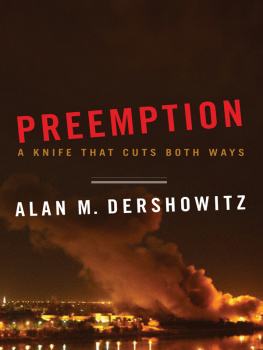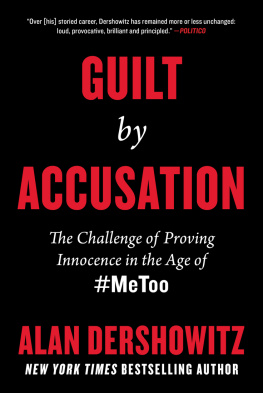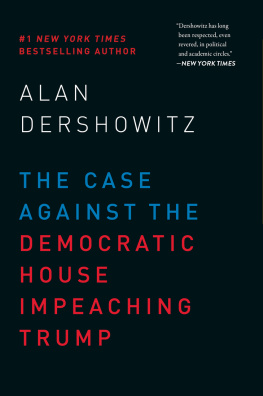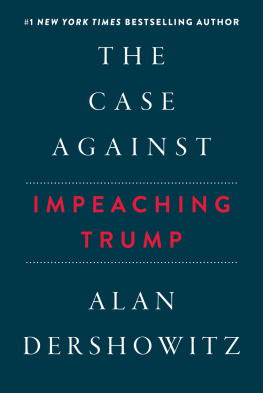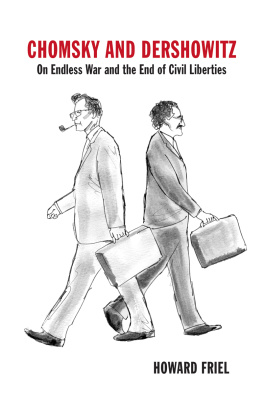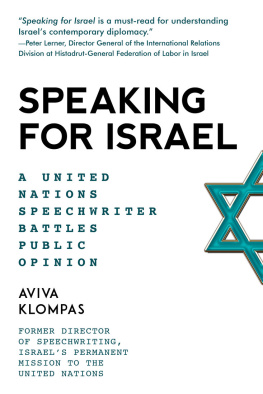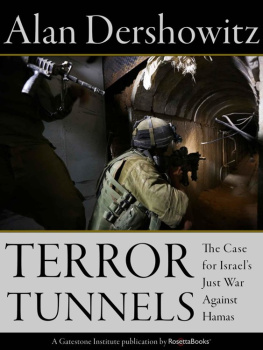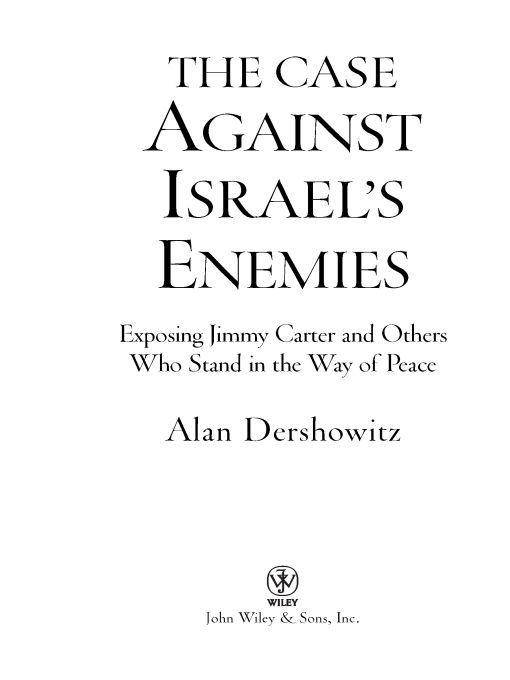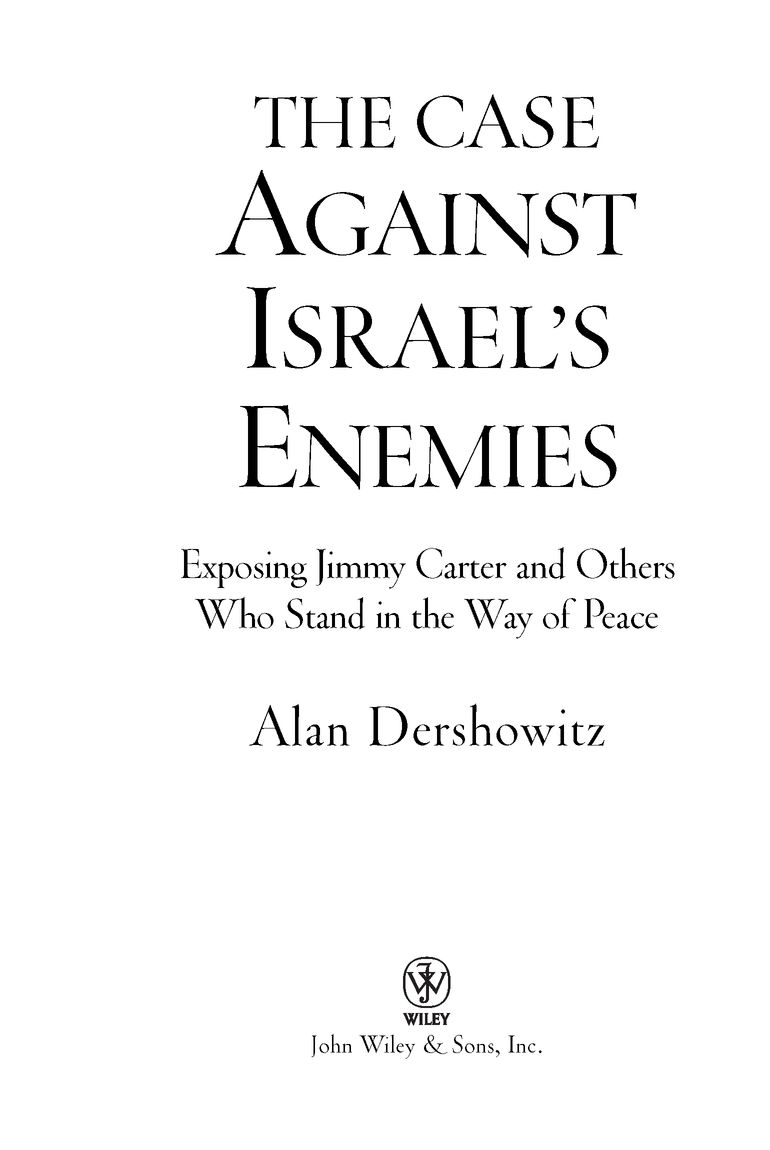Table of Contents
Books by Alan Dershowitz
Is There a Right to Remain Silent? Coercive Interrogation and the Fifth Amendment after 9/11
Finding Jefferson: A Lost Letter, a Remarkable Discovery, and the First Amendment in an Age of Terrorism
Blasphemy: How the Religious Right Is Hijacking Our Declaration of Independence
Preemption: A Knife That Cuts Both Ways
What Israel Means to Me: By 80 Prominent Writers, Performers, Scholars, Politicians, and Journalists
Rights from Wrongs: A Secular Theory of the Origins of Rights
America on Trial: Inside the Legal Battles That Transformed Our Nation
The Case for Peace: How the Arab-Israeli Conflict Can Be Resolved
The Case for Israel
America Declares Independence
Why Terrorism Works: Understanding the Threat, Responding to the Challenge
Shouting Fire: Civil Liberties in a Turbulent Age
Letters to a Young Lawyer
Supreme Injustice: How the High Court Hijacked Election 2000
Genesis of Justice: Ten Stories of Biblical Injustice That Led to the Ten Commandments and Modern Law
Just Revenge
Sexual McCarthyism: Clinton, Starr, and the Emerging Constitutional Crisis
The Vanishing American Jew: In Search of Jewish Identity for the Next Century
Reasonable Doubts: The Criminal Justice System and the O.J. Simpson Case
The Abuse Excuse: And Other Cop-Outs, Sob Stories, and Evasions of Responsibility
The Advocates Devil
Contrary to Popular Opinion
Chutzpah
Taking Liberties: A Decade of Hard Cases, Bad Laws, and Bum Raps
Reversal of Fortune: Inside the von Blow Case
The Best Defense
Criminal Law: Theory and Process
Psychoanalysis: Psychiatry and Law
This book is dedicated to Israels constructive and nuanced critics,
whose rational voices are too often drowned out by the exaggerations,
demonizations, and hate-filled lies put forth by Israels enemies.
Criticism is the lifeblood of democracy and a sure sign of admiration
for an imperfect democracy seeking to improve itself.
ACKNOWLEDGMENTS
This book was a collaborative effort in which my student research assistants played a significant role in reviewing and critiquing the writings of Israels enemies. The students who worked directly on the research for this book included Peter Mulcahy, Joel Pollack, Danielle Sassoon, and Chaim Kagedan.
The students who worked on my earlier writings, which have been adapted for inclusion in this book, include Mitch Webber, Aaron Voloj Dessauer, Alexander Blenkinsopp, Charles Johnson, Alexandra Katz, and Elizabeth Pugh.
I also wish to acknowledge my assistant, Sarah Neely, for shepherding the project and typing the manuscript.
Thanks also to Helen Rees, my agent, and Hana Lane, my editor, for encouraging me to write this book, and to Lisa Burstiner for her excellent copyediting.
And to my Brooklyn friends and my family who reviewed and made useful suggestions on earlier drafts, my constant appreciation.
Finally, thanks to my lecture audiences and e-mail correspondents, who convinced me that this was a book that had to be written.
Introduction
For a tiny nation of a little more than six and a half million citizens (approximately 5.3 million of whom are Jewish and 1.3 million are Muslim and Christian Arabs) living in an area roughly the size of New Jersey, Israel has proportionally more enemies than any nation on earth. No nation has been threatened more often with divestment, boycotts, and other sanctions. No nation has generated more protests against it on college and university campuses. No nation has been targeted for as much editorial abuse from the worldwide media. No nation has been subjected to more frequent threats of annihilation. No nation has had more genocidal incitements directed against its citizens.
It is remarkable indeed that a democratic nation born in response to a decision of the United Nations should still not be accepted by so many countries, groups, and individuals. No other UN member is threatened with physical destruction by other member states so openly and with so little rebuke from the General Assembly or the Security Council. Indeed, no nation, regardless of its size or the number of deaths it has caused, has been condemned as often by the UN and its constituent bodies. Simply put, no nation is hated as much as the Jewish nation.
Yet over the last sixty years, no nation in the world has contributed more per capita to the general welfare of the people of this planet than Israel. Israel has exported more lifesaving medical technology to the far-flung corners of the earth than any nation of comparable size. It has done more to protect the environment; to promote literature, music, and the arts and sciences; and to spread agricultural advances. Its scientists and engineers have secured more patents and its high-tech entrepreneurs more new listings on NASDAQ than any but the largest nations in the world. Its academics have won more international prizes, published more papers, and achieved more technological breakthroughs than any other nation of comparable size. Its students have been accepted at more elite graduate and professional schools than those of other small countries.
And Israel has learned and taught others how to fight terrorism within the rule of law. Israel has created a legal system that is the envy of the world, with a Supreme Court that stands at the pinnacle of democratic judiciariesa court open to all with few, if any, restrictions on its jurisdiction. As Americas most liberal Supreme Court justice, William Brennan, observed when he visited Israel in 1987,
It may well be Israel, not the United States, that provides the best hope for building a jurisprudence that can protect civil liberties against the demands of national security. For it is Israel that has been facing real and serious threats to its security for the last forty years and seems destined to continue facing such threats in the foreseeable future. The struggle to establish civil liberties against the backdrop of these security threats, while difficult, promises to build bulwarks of liberty that can endure the fears and frenzy of sudden dangerbulwarks to help guarantee that a nation fighting for its survival does not sacrifice those national values that make the fight worthwhile....
I [would not] be surprised if in the future the protections generally afforded civil liberties during times of world danger owed much to the lessons Israel learns in its struggle to preserve simultaneously the liberties of its citizens and the security of its nation. For in this crucible of danger lies the opportunity to forge a worldwide jurisprudence of civil liberties that can withstand the turbulences of war and crisis.
Israels media have become models of openness and self-criticism, in which every perspective from the hard anti-Zionist left to the hardest right may be heard and seen. So may Israeli Arabs, many of whom do not accept the legitimacy of the Zionist state. As an Israeli friend once quipped, Israelis and Palestinians have exactly the same free speech rights: they may both condemn the Israeli prime minister and praise the leader of Hamas.


